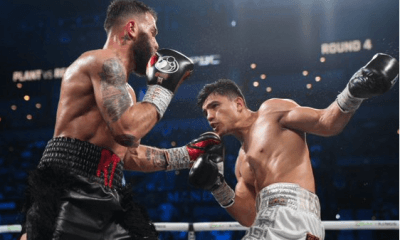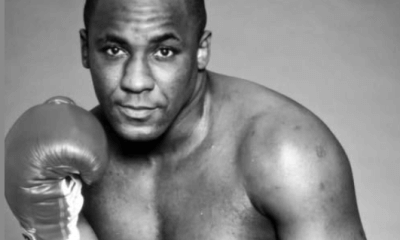Articles of 2009
A Quarter-Century Later, '84 Olympians Take Curtain Call
Some will tell you it is always best to live in the moment, that it is fruitless and counter-productive to dwell on the past or to fixate on what the future might hold. But proponents of a live-for-today philosophy fail to understand basic human nature: those who have known glory are naturally hesitant to let go of their memories of what was, and those who have never experienced some great, defining moment can’t help but believe that it is just around the next corner.
For the winningest United States Olympic boxing team ever – the 1984 team that competed in Los Angeles claimed 11 total medals and nine golds, both records – the past and the future will merge on Aug. 15, when most surviving members of that juggernaut gather at the Atlanta Marriott Century Center to recall their time together and to again soak up the adulation that for many began to slip away almost from the moment their status as national heroes was stamped with an expiration date.
Now middle-aged men beset with the same sort of problems that afflict so many others who never took a turn in the spotlight, the ’84 Olympians will be held up as examples of what can happen when fate, luck and talent converge at a particular moment in time to produce magic.
“Those guys made history together,” said Xavier Biggs, the proprietor of a Decatur, Ga., boxing gym, older brother of super heavyweight gold medalist Tyrell Biggs and the reunion organizer. “They need people to remember and appreciate what they accomplished. Sometimes it seems like everybody has forgotten them, and that isn’t right.”
Next month’s celebration is actually the third in a series of such events. Xavier Biggs staged the first such reunion last Sept. 20, in Atlanta. The second was Jan. 22, in Charlotte, N.C. The Aug. 15 fete is expected to be attended by Tyrell Biggs, Meldrick Taylor, Evander Holyfield, Frank Tate, Virgil Hill, Robert Shannon, Paul Gonzales and Henry Tillman.
It is not the fault of the ’84 Olympians – Xavier Biggs has not been able to confirm the participation of Jerry Page and Mark Breland, and of course the late Steve McCrory will be there only in spirit – that many boxing historians hold in higher esteem the 1976 U.S. Olympic boxing team headed by Sugar Ray Leonard, Howard Davis Jr. and the Spinks brothers, Leon and Michael. That squad, which competed in Montreal, won seven overall medals, including five golds, against a tougher slate of opponents due to the 1984 Olympic boycott of 13 Soviet Bloc nations plus Cuba.
All you can do is defeat whoever is standing of front of you, which almost without exception the ’84 team did.
“I heard people who won gold medals talk about what an indescribable feeling it was,” said Tyrell Biggs, whose post-Olympic life was derailed by drug addiction. “And it’s true. Words can’t explain it. That had to be the best feeling I ever had. It’s an unbelievable high, man.”
But Leonard said the ultimate measure of how successful an Olympic boxing team is depends more on the quality of opposition than in the number of medals won.
“I may be biased, but I consider my team better than any other team,” Leonard, who upset Cuba’s Andres Aldama in the 139-pound final in 1976, said from his home in Pacific Palisades, Calif. “We went to Montreal favored to win only one gold medal, and that was by Howard Davis.
“But we surprised a lot of people, didn’t we? We showed to the world that we had a sensational, incredible team. All of our final matches were against Cuba, against Russia. To win, we had to beat the best of the best.”
The 1984 team also went against a field thinned by a boycott. But the 28 black African nations that stayed away from Montreal, to protest participation in the Olympics by New Zealand, which had flouted international sanctions by welcoming a touring rugby team from South Africa, whose white ruling class had an official policy of apartheid, were for the most part not considered medal contenders.
Ed Schuyler Jr., the longtime, now-retired boxing writer for the Associated Press, said the 1984 team would not have had such an inflated medal haul had the Cubans and Eastern Europeans come to Los Angeles.
“The ’76 team was by far the best the United States has ever produced,” Schuyler said when asked to compare the relative merits of the ’76 and ’84 squads. “Hands down. It’s not even fair to compare that bunch with any other.
“Leo Randolph beat a Cuban. Leon Spinks beat a Cuban. Sugar Ray beat a Cuban. I mean, come on. Yeah, there was a boycott by some of the African countries, but they weren’t medal threats in boxing for the most part. The Russians and the East Germans and especially the Cubans were.”
Not that the 1984 Olympians fared poorly once they went on to the so-called “next level,” the pros. Pernell Whitaker, the team’s 132-pound representative and a six–time world champion in three weight classes, was inducted into the International Boxing Hall of Fame in 2008. Evander Holyfield, a four-time heavyweight titlist, and Virgil Hill, who captured championship belts at light-heavyweight and cruiserweight, each enjoyed long, successful careers that almost certainly will lead to enshrinement in Canastota, N.Y., someday, once they become eligible.
Mark Breland, one of the most celebrated American Olympians ever, probably was the biggest name heading into the L.A. Games and he did what was expected of him by winning a gold medal. The youngest member of that squad, the 17-year-old Taylor, didn’t enjoy the career longevity of some of his teammates, but for several years his flame burned as bright and as hot as anyone’s in the game. He, too, took gold, as did Paul Gonzales (who was voted the Val Barker Award as the Olympics’ top boxer), Whitaker, Page, Henry Tillman and the late Steve McCrory. Holyfield, who competed in the 178-pound weight class, was virtually assured of being the 10th gold medalist, but he had to settle for a bronze medalist when a Yugoslavian referee, Gligorie Novicic, controversially disqualified him in the semifinals for landing a left hook to the jaw of New Zealand’s Kevin Barry a split-second after Novicic yelled “Stop!”
Hill, who went home with a silver medal, and Holyfield thus came up a bit short of gold, with only 119-pounder Robert Shannon, from Edmonds, Wash., the only American Olympian to fail to medal.
In their post-Olympic lives, almost all of the 1984 Olympians have fallen upon hardship at one time or another. The most recent to face adversity is Holyfield, whose 109-room mansion in Fairburn, Ga., was placed under foreclosure. Even though he earned in excess of $200 million during his ring career, the upkeep on Holyfield’s palatial digs and his massive child support payments – he fathered 11 children by nine women – eventually dealt him the sort of financial battering that Riddick Bowe, Lennox Lewis and Mike Tyson could not physically administer inside the ropes.
Whitaker and Biggs had drug issues which eroded their fortunes and good names, although each now claims to be clean. Whitaker recently took over as the lead trainer of former IBF lightweight champion Paul Spadafora, while Biggs spends his afternoons hanging out at a recreation center in his old hometown of Philadelphia.
“I wasn’t doing hard drugs any more, but I was bingeing on other things,” Biggs said of his decline after a brutal, seventh-round stoppage at the hands of undisputed heavyweight champion Mike Tyson on Oct. 16, 1987. I’d binge on sex. When you have money – and I made a lot of money to fight Tyson (a reported $1 million) – of course that’s going to attract women.
“I also binged on food, on certain candy bars. I’d go in the store and buy three of them. Then I’d go back and buy three more. Next trip, I’d buy the whole box.”
Taylor, who never quite was the same after he lost his junior welterweight unification showdown with Julio Cesar Chavez on March 17, 1990 – that’s the bout Taylor was winning on the scorecards when referee Richard Steele awarded JCC a technical-knockout victory with only two seconds remaining in the 12th and final round – had possibly the fastest hands ever seen in boxing. Faster than Roy Jones Jr.? Possibly. Faster than Floyd Mayweather Jr., whose blurring hand speed has been called the “fastest in boxing history” in that commercial with Bill Kurtis? A lot of people think so.
Put it this way: if an in-his-prime Taylor was an Old West gunfighter and he found himself slapping leather with Mayweather in, say, Dodge City, there’s a good chance it would be “Money” who would wind up face-down in the street, having failed to clear the holster.
“Everybody knows I had the fastest hands in boxing,” Taylor, his speech noticeably slurred, said in recalling the rapid-fire combinations he once was able to routinely dial up. “Mayweather knows his hands aren’t faster than mine. That’s not even in dispute.”
Also beyond dispute is the fact that Taylor, who won world title at junior welter and welter, fell far once that marvelous hand speed diminished, and with it the fortune he had amassed with his fists.
“Of course, we would do things wiser with the money we made,” Taylor said of the financial pitfalls he and other members of the ’84 team did not avoid. “People make mistakes. They get careless. When you have money, you blow money. You live beyond your means sometimes.”
It’s been a long time since the U.S. Olympic boxing Class of 1984 was hailed as bona fide American heroes and celebrated with parades, keys to the city in their respective hometowns, and wooed with large signing bonuses by promoters and managers hoping to capitalize on their instant fame. But what’s past is past. Time marches on. People forget.
Sometimes, though, yesterday’s chosen few get another chance to bask in the glow of recycled celebrity. On Aug. 15, it will be as if these pugilistic brothers in arms again are young, fit and prepared for the shared promise of a brighter tomorrow.
May all of you hear the echoes of the Star-Spangled Banner in your heads as you again figuratively mount the medal platform. Oh, it can’t be like it was the first time around. But the guess here is that it’ll be good enough.
-

 Featured Articles4 weeks ago
Featured Articles4 weeks agoA Night of Mismatches Turns Topsy-Turvy at Mandalay Bay; Resendiz Shocks Plant
-

 Featured Articles2 weeks ago
Featured Articles2 weeks agoAvila Perspective, Chap. 330: Matchroom in New York plus the Latest on Canelo-Crawford
-

 Featured Articles1 week ago
Featured Articles1 week agoVito Mielnicki Jr Whitewashes Kamil Gardzielik Before the Home Folks in Newark
-

 Featured Articles4 weeks ago
Featured Articles4 weeks agoRemembering the Under-Appreciated “Body Snatcher” Mike McCallum, a Consummate Pro
-

 Featured Articles4 weeks ago
Featured Articles4 weeks agoAvila Perspective, Chap 329: Pacquiao is Back, Fabio in England and More
-

 Featured Articles3 weeks ago
Featured Articles3 weeks agoOpetaia and Nakatani Crush Overmatched Foes, Capping Off a Wild Boxing Weekend
-

 Featured Articles3 weeks ago
Featured Articles3 weeks agoFabio Wardley Comes from Behind to KO Justis Huni
-

 Featured Articles2 weeks ago
Featured Articles2 weeks agoCatching Up with Clay Moyle Who Talks About His Massive Collection of Boxing Books















